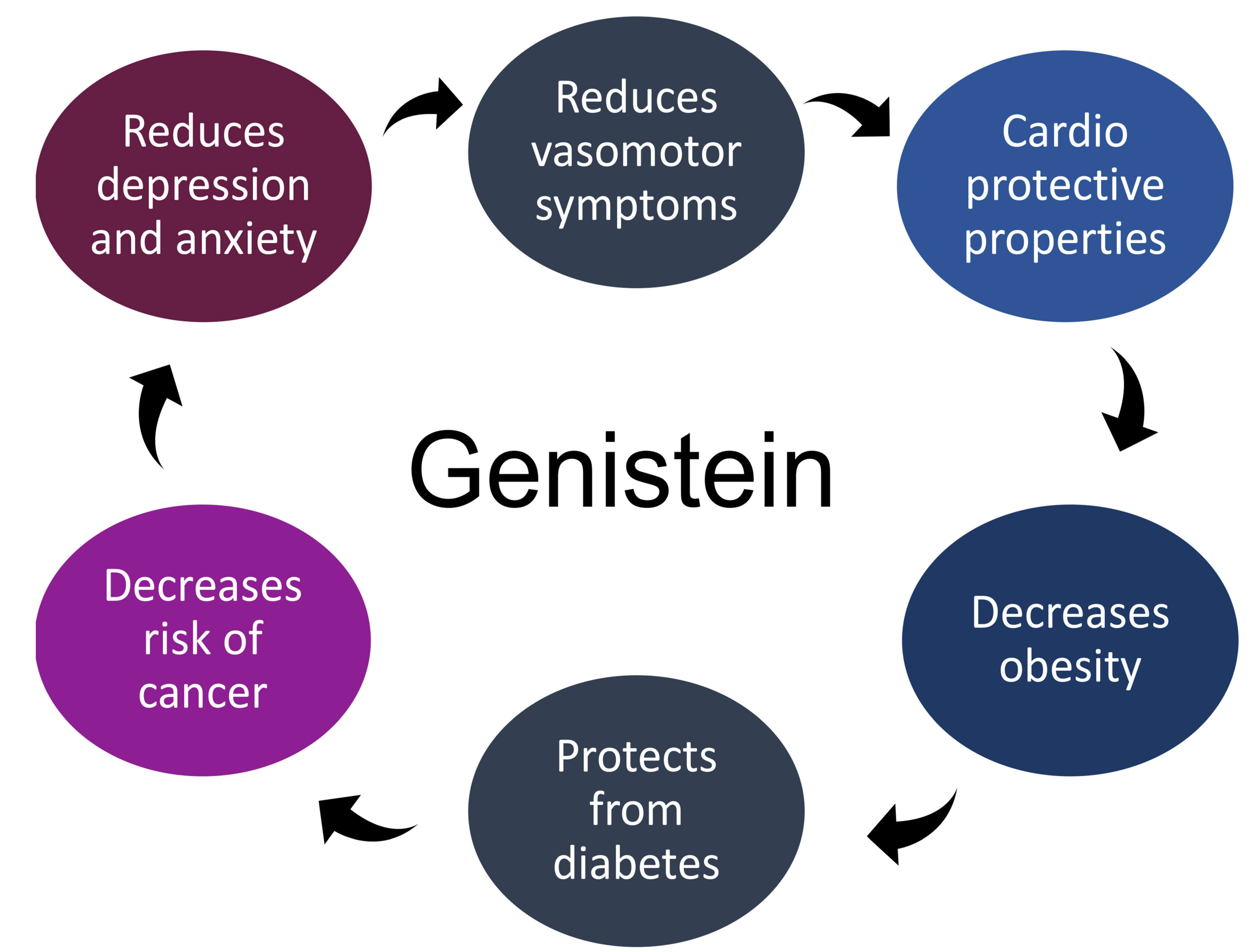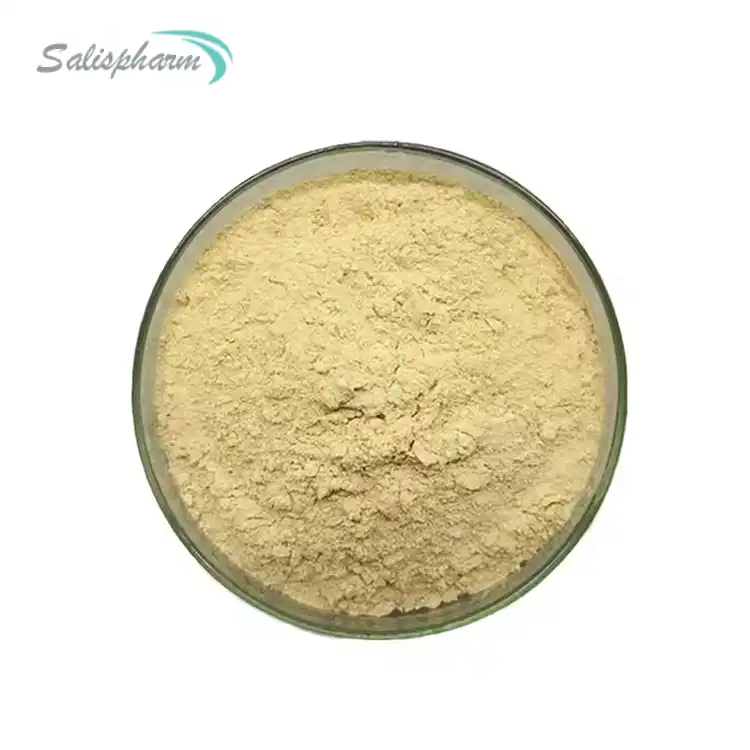Genistein powder is a naturally occurring isoflavone compound found in various plants, particularly soybeans. It has gained significant attention in the scientific community due to its potential health benefits and inhibitory effects on various biological processes. This blog post will explore the inhibitory properties of genistein powder and its potential applications in health and medicine.

How does Genistein Powder affect cancer cell growth?
One of the most extensively studied properties of genistein powder is its potential to inhibit cancer cell growth. Numerous studies have demonstrated that genistein can affect various aspects of cancer cell biology, potentially slowing or preventing the progression of certain types of cancer.
Genistein has been shown to inhibit the growth and proliferation of cancer cells through multiple mechanisms. One of the primary ways it achieves this is by interfering with cell signaling pathways that are essential for cancer cell survival and proliferation. For instance, genistein has been found to inhibit the activity of protein tyrosine kinases, which are enzymes involved in cell growth and division. By blocking these enzymes, genistein can potentially slow down or halt the rapid division of cancer cells.
Moreover, genistein has demonstrated the ability to induce apoptosis, or programmed cell death, in various types of cancer cells. This process is crucial for eliminating damaged or abnormal cells that could potentially become cancerous. Research has shown that genistein can trigger apoptosis in breast, prostate, colon, and other types of cancer cells, making it a promising compound in cancer prevention and treatment strategies.
Another way genistein inhibits cancer cell growth is by interfering with angiogenesis, the process by which new blood vessels form to supply tumors with nutrients and oxygen. By inhibiting angiogenesis, genistein can potentially starve tumors of the resources they need to grow and spread. This anti-angiogenic property has been observed in various cancer types, including breast, prostate, and colon cancer.
Furthermore, genistein has been found to have synergistic effects when combined with certain chemotherapy drugs. Studies have shown that genistein can enhance the effectiveness of some cancer treatments while potentially reducing their side effects. This suggests that genistein could be a valuable adjunct therapy in cancer treatment protocols.
What role does Genistein Powder play in hormone regulation?
Genistein powder is known for its ability to interact with hormone systems in the body, particularly estrogen. As a phytoestrogen, genistein can mimic some of the effects of estrogen, which has implications for hormone regulation and various health conditions.
One of the primary ways genistein affects hormone regulation is through its interaction with estrogen receptors. Genistein has a structural similarity to estradiol, the primary form of estrogen in humans, allowing it to bind to estrogen receptors. However, genistein's effects are generally weaker than those of natural estrogen, which can lead to both agonistic and antagonistic effects depending on the tissue and the existing estrogen levels in the body.
In terms of inhibition, genistein has been shown to inhibit certain enzymes involved in estrogen metabolism. For example, it can inhibit aromatase, an enzyme responsible for converting androgens to estrogens. This inhibition could potentially reduce estrogen levels in the body, which may be beneficial in certain hormone-dependent conditions such as breast cancer.
Genistein's hormone-regulating properties have also been studied in the context of menopausal symptoms. Some research suggests that genistein may help alleviate some of the symptoms associated with menopause, such as hot flashes and bone loss, by providing a mild estrogenic effect. However, it's important to note that the effectiveness of genistein for menopausal symptoms can vary among individuals, and more research is needed to fully understand its potential in this area.
Additionally, genistein has been found to inhibit the activity of 5-alpha-reductase, an enzyme that converts testosterone to dihydrotestosterone (DHT). DHT is a more potent form of testosterone that has been implicated in conditions such as benign prostatic hyperplasia (BPH) and male pattern baldness. By inhibiting this enzyme, genistein may help reduce the risk or progression of these conditions.
It's worth noting that while genistein's hormone-regulating properties can be beneficial in many cases, they also raise some concerns. For individuals with hormone-sensitive conditions, such as certain types of breast cancer, the effects of genistein should be carefully considered and discussed with a healthcare provider.
Can Genistein Powder inhibit inflammation and oxidative stress?
Genistein powder has demonstrated significant potential in inhibiting inflammation and oxidative stress, two processes that play crucial roles in various chronic diseases and aging. The anti-inflammatory and antioxidant properties of genistein make it a compound of interest for researchers studying ways to prevent and manage a wide range of health conditions.
In terms of inflammation, genistein has been shown to inhibit several key players in the inflammatory process. For instance, it can suppress the production of pro-inflammatory cytokines such as tumor necrosis factor-alpha (TNF-α) and interleukin-6 (IL-6). These cytokines are signaling molecules that promote inflammation in the body, and their excessive production is associated with chronic inflammatory conditions.
Genistein also inhibits the activation of nuclear factor kappa B (NF-κB), a transcription factor that regulates the expression of many genes involved in inflammation. By suppressing NF-κB activation, genistein can potentially reduce the overall inflammatory response in the body. This anti-inflammatory action has been observed in various studies, including those focusing on cardiovascular diseases, arthritis, and inflammatory bowel diseases.
Moreover, genistein has been found to inhibit the activity of cyclooxygenase-2 (COX-2), an enzyme that produces prostaglandins, which are involved in inflammation and pain. This inhibition is similar to the action of some non-steroidal anti-inflammatory drugs (NSAIDs), suggesting that genistein could potentially offer natural anti-inflammatory benefits.
Regarding oxidative stress, genistein exhibits potent antioxidant properties. It can directly scavenge free radicals, which are unstable molecules that can damage cells and contribute to various diseases and aging. By neutralizing these free radicals, genistein helps protect cells from oxidative damage.
Furthermore, genistein has been shown to enhance the body's own antioxidant defenses. It can increase the activity of antioxidant enzymes such as superoxide dismutase (SOD), catalase, and glutathione peroxidase. These enzymes play crucial roles in neutralizing harmful reactive oxygen species (ROS) in the body, thereby reducing oxidative stress.
The combination of anti-inflammatory and antioxidant properties makes genistein a promising compound for promoting overall health and potentially preventing or managing various chronic diseases. Its ability to inhibit both inflammation and oxidative stress could have implications for conditions such as cardiovascular diseases, neurodegenerative disorders, and certain types of cancer.
Conclusion
Genistein powder exhibits a wide range of inhibitory effects on various biological processes. Its ability to inhibit cancer cell growth, regulate hormones, and reduce inflammation and oxidative stress makes it a compound of significant interest in the fields of nutrition and medicine. While more research is needed to fully understand its potential applications and long-term effects, the current evidence suggests that genistein could play a valuable role in promoting health and preventing disease. As with any supplement or natural compound, it's important to consult with a healthcare provider before incorporating genistein powder into your health regimen, especially if you have pre-existing health conditions or are taking medications.
If you are also interested in this product and want to know more product details, or want to know about other related products, please feel free to contact lea_slsbio@163.com,WhatsApp+86 13193326505.

References
1. Spagnuolo, C., Russo, G. L., Orhan, I. E., Habtemariam, S., Daglia, M., Sureda, A., ... & Nabavi, S. M. (2015). Genistein and cancer: current status, challenges, and future directions. Advances in nutrition, 6(4), 408-419.
2. Ganai, A. A., & Farooqi, H. (2015). Bioactivity of genistein: A review of in vitro and in vivo studies. Biomedicine & Pharmacotherapy, 76, 30-38.
3. Sureda, A., Sanches Silva, A., Sánchez-Machado, D. I., López-Cervantes, J., Daglia, M., Nabavi, S. F., & Nabavi, S. M. (2017). Hypotensive effects of genistein: From chemistry to medicine. Chemico-biological interactions, 268, 37-46.
4. Mukund, V., Mukund, D., Sharma, V., Mannarapu, M., & Alam, A. (2017). Genistein: Its role in metabolic diseases and cancer. Critical reviews in oncology/hematology, 119, 13-22.
5. Polkowski, K., & Mazurek, A. P. (2000). Biological properties of genistein. A review of in vitro and in vivo data. Acta Poloniae Pharmaceutica, 57(2), 135-155.
6. Yu, J., Bi, X., Yu, B., & Chen, D. (2016). Isoflavones: Anti-inflammatory benefit and possible caveats. Nutrients, 8(6), 361.
7. Cai, Y., Zhao, B., Liang, Q., Zhang, Y., Cai, J., & Li, G. (2017). The selective effect of genistein on the toxicity of bleomycin in normal lymphocytes and HL-60 cells. Toxicology letters, 272, 68-74.
8. Setchell, K. D., & Cassidy, A. (1999). Dietary isoflavones: biological effects and relevance to human health. The journal of nutrition, 129(3), 758S-767S.
9. Banerjee, S., Li, Y., Wang, Z., & Sarkar, F. H. (2008). Multi-targeted therapy of cancer by genistein. Cancer letters, 269(2), 226-242.
10. Dixon, R. A., & Ferreira, D. (2002). Genistein. Phytochemistry, 60(3), 205-211.

